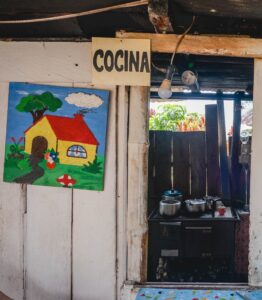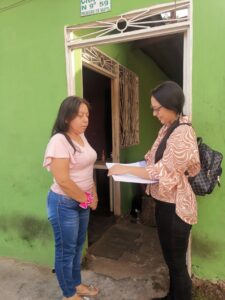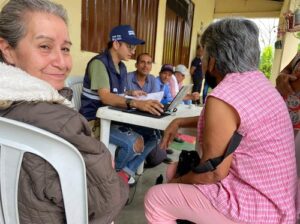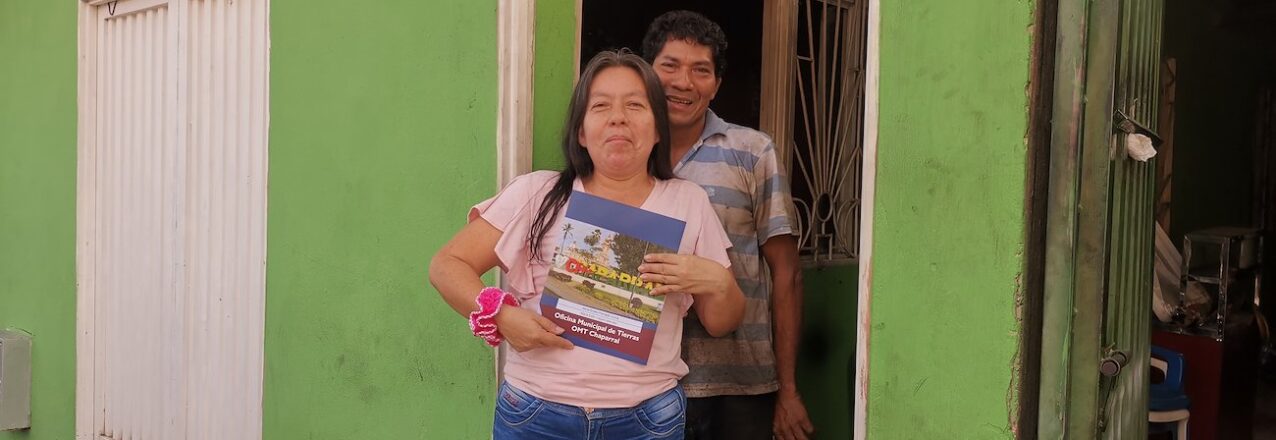USAID is helping the municipality of Chaparral, Tolima to carry out local land administration tasks and play a larger role in the future of rural property.
Edith Vaquiro and José Preciado have had their ups and down with home ownership. When they bought their first home in rural Chaparral, Tolima, thieves entered their property and dismantled their house. It was stolen right under their noses.
In 1999, they sold that lot and bought a new parcel closer to the center of Chaparral. This time they built everything with their own hands, first with wooden boards that they later replaced with cement walls. The lot includes a garage where José works on 4×4 vehicles, the kind that are used to access the mountain towns of Southern Tolima.
“We struggled and worked hard. For many years we did not have a floor or a door. And we just kept working,” says Preciado.
Eventually, Preciado installed a concrete floor and a proper door. This year, the couple achieved a new goal: the property title.
 Theirs is one of 30 land titles delivered at an event earlier this year by Chaparral’s Municipal Land Office (MLO), which was created with support from the Land for Prosperity. The Land Office operates under the Municipality’s Secretary of Planning and is something of a one-stop shop for local land administration. It facilitates rural development initiatives and allows the local leaders to deliver on state-led land titling strategies that take the onus off land owners.
Theirs is one of 30 land titles delivered at an event earlier this year by Chaparral’s Municipal Land Office (MLO), which was created with support from the Land for Prosperity. The Land Office operates under the Municipality’s Secretary of Planning and is something of a one-stop shop for local land administration. It facilitates rural development initiatives and allows the local leaders to deliver on state-led land titling strategies that take the onus off land owners.
“Without a land title, it’s as if you had nothing. We now feel like owners of something,” says Edith Vaquiro.
Thanks to the couple’s business, they have been servicing a small loan in order to make home improvements. Now, with the land title as a qualified form of collateral, they plan to take a larger loan and build a second floor on their home.
Stronger Capacity for Land Administration
 For now, the Municipal Land Office is operating thanks to Natalia Quinoñes. As the MLO’s legal expert, she reviews hundreds of urban properties and provides citizens with information to begin to understand the complexity of Colombia’s land laws and the process of property formalization. Quiñones graduated in law last year and is relatively new to the land administration. In her job, learning is a continuous process, and she studies how land laws are evolving in today’s Colombia.
For now, the Municipal Land Office is operating thanks to Natalia Quinoñes. As the MLO’s legal expert, she reviews hundreds of urban properties and provides citizens with information to begin to understand the complexity of Colombia’s land laws and the process of property formalization. Quiñones graduated in law last year and is relatively new to the land administration. In her job, learning is a continuous process, and she studies how land laws are evolving in today’s Colombia.
“In law school, they did not spend a lot of time on property law, so I never had a deep understanding of the process. I have learned so much through the experience, and I continue to study and learn every day,” she says.
Eight of out 10 properties in the municipality of Chaparral are informally owned, meaning they lack a land title. In the urban center, the rates of informal land ownership could be lower, but the government does not have an updated cadaster of which properties have registered land titles and which do not.
“Chaparral has problems with informality. The tools of the Municipal Land Office can solve them.”
— Natalia Quiñones, land formalization expert in Chaparral, Tolima
Since 2020, 42 USAID-supported Municipal and Regional Land Offices delivered over 6,800 land titles to families living in the urban areas of rural municipalities. In addition, the land offices have formalized more than 1,600 public properties and provided land and property services to more than 16,000 citizens.
A Formal Land Market
In May 2023, Land for Prosperity began implementing the Rural Property and Land Use Plan, known as POSPR by its Spanish acronym, by creating project schedules, training timetables, and plans for security, communications, and environmental management. Chaparral’s Municipal Land Office is critical to supporting the land formalization teams and is a conduit between government land agencies to process land titles, update the cadaster, and file all the information on land use, collected over the 12-month implementation period.
 LFP helped to delineate the city’s urban perimeter, verified the geodesic network, and divided the municipality into workable intervention units. The parcel visit phase has begun and rural families in Chaparral are participating in the process. The POSPR is surveying an area of more than 88,000 hectares and approximately 8,600 parcels. More than 2,600 parcels are expected to be titled by the National Land Agency.
LFP helped to delineate the city’s urban perimeter, verified the geodesic network, and divided the municipality into workable intervention units. The parcel visit phase has begun and rural families in Chaparral are participating in the process. The POSPR is surveying an area of more than 88,000 hectares and approximately 8,600 parcels. More than 2,600 parcels are expected to be titled by the National Land Agency.
Chaparral is one of 11 municipalities being supported by USAID under the Rural Property and Land Use Plans. The POSPR methodology is strengthening land tenure and providing legal certainty for more than 22,000 parcels across Colombia. In each municipality, the POSPR methodology is reducing informal land ownership in rural Colombia, strengthening institutional capacity for land administration, and educating the population on formal land ownership.
Cross-posted from USAID Exposure


